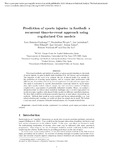Mostrar el registro sencillo del ítem
Prediction of sports injuries in football: a recurrent time-to-event approach using regularized Cox models
| dc.creator | Zumeta-Olaskoaga, Lore | es_ES |
| dc.creator | Weigert, Maximilian | es_ES |
| dc.creator | Larruskain, Jon | es_ES |
| dc.creator | Bikandi Latxaga, Eder | es_ES |
| dc.creator | Setuain Chourraut, Igor | es_ES |
| dc.creator | Lekue, Josean | es_ES |
| dc.creator | Küchenhoff, Helmut | es_ES |
| dc.creator | Lee, Dae-Jin | es_ES |
| dc.date.accessioned | 2022-04-26T06:53:47Z | |
| dc.date.available | 2022-11-05T00:00:15Z | |
| dc.date.issued | 2021 | |
| dc.identifier.issn | 1863-8171 | |
| dc.identifier.uri | https://hdl.handle.net/2454/42800 | |
| dc.description.abstract | Data-based methods and statistical models are given special attention to the studyof sports injuries to gain in-depth understanding of its risk factors and mechanisms. The objective of this work is to evaluate the use of shared frailty Cox models forthe prediction of occurring sports injuries, and to compare their performance withdifferent sets of variables selected by several regularized variable selection approaches. The study is motivated by specific characteristics commonly found for sports injury data, that usually include reduced sample size and even fewer number of injuries,coupled with a large number of potentially influential variables. Hence, we conduct asimulation study to address these statistical challenges and to explore regularized Cox model strategies together with shared frailty models in different controlled situations. We show that predictive performance greatly improves as more player observations areavailable. Methods that result in sparse models and favour interpretability, e.g. best subset selection and boosting, are preferred when the sample size is small. We include a real case study of injuries of female football players of a Spanish football club. | en |
| dc.description.sponsorship | This research was supported by the Basque Government through the BERC Programme 2018–2021 by the Spanish Ministry of Science, Innovation and Universities MICINN and FEDER: BCAM Severo Ochoa excellence accreditation SEV-2017-0718, and project PID2020-115882RB-I00 funded by AEI/FEDER, UE and acronym ‘S3M1P4R’ and by the German Federal Ministry of Education and Research (BMBF) under Grant No. 01IS18036A. | en |
| dc.format.extent | 19 p. | |
| dc.format.mimetype | application/pdf | en |
| dc.language.iso | eng | en |
| dc.publisher | Springer | en |
| dc.relation.ispartof | AStA Advances in Statistical Analysis, 2021 | en |
| dc.subject | Shared frailty models | en |
| dc.subject | Regularized Cox methods | en |
| dc.subject | Sports injury prevention | en |
| dc.subject | Survival analysis | en |
| dc.title | Prediction of sports injuries in football: a recurrent time-to-event approach using regularized Cox models | en |
| dc.type | info:eu-repo/semantics/article | en |
| dc.type | Artículo / Artikulua | es |
| dc.contributor.department | Ciencias de la Salud | es_ES |
| dc.contributor.department | Osasun Zientziak | eu |
| dc.rights.accessRights | info:eu-repo/semantics/openAccess | en |
| dc.rights.accessRights | Acceso abierto / Sarbide irekia | es |
| dc.embargo.terms | 2022-11-05 | |
| dc.identifier.doi | 10.1007/s10182-021-00428-2 | |
| dc.relation.projectID | info:eu-repo/grantAgreement/AEI/Plan Estatal de Investigación Científica y Técnica y de Innovación 2017-2020/PID2020-115882RB-I00/ES/ | en |
| dc.relation.publisherversion | https://doi.org/10.1007/s10182-021-00428-2 | |
| dc.type.version | info:eu-repo/semantics/acceptedVersion | en |
| dc.type.version | Versión aceptada / Onetsi den bertsioa | es |


